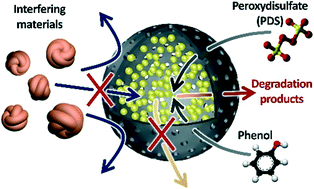Publication
Advanced Redox Technology Lab
Publication
Advanced Redox Technology Lab
Journal papers
The increased production and release of organic pollutants due to industrial development has necessitated effective water treatment technologies. In this study, an unprecedented yolk–shell-structured catalyst was developed and evaluated for the oxidative degradation of organic pollutants. Gold nanospheres (AuNSs) encapsulated in mesoporous silica nanocapsules (AuNS@ySiO2) were synthesized via seeded growth and a subsequent selective etching process, and their characteristic properties were analyzed thoroughly. To investigate the catalytic performance of the AuNS@ySiO2/peroxydisulfate (PDS) system, comparative experiments were performed with various control groups of different structures (bulk AuNS suspension, hollow silica nanocapsules without AuNSs, and AuNS-decorated silica nanoparticles) with phenol as the target compound. The AuNS@ySiO2/PDS system exhibited outstanding performance in phenol degradation compared to the control groups with an identical amount of AuNSs, which resulted from the enhanced colloidal stability of the AuNSs. A series of experiments to elucidate the mechanism of phenol degradation suggested that electron transfer from phenol to PDS mediated by AuNSs is a highly plausible pathway. Furthermore, in the presence of humic acid, phenol degradation by the AuNS@ySiO2/PDS system was significantly less inhibited compared to the results for the control group (AuNS-decorated silica nanoparticles), owing to the molecular sieving effect of the mesoporous silica shell constituting AuNS@ySiO2. The newly developed yolk–shell-structured catalyst can prospectively be effectively applied in the catalytic oxidation of organic pollutants owing to its unique structural properties and high catalytic activity.
